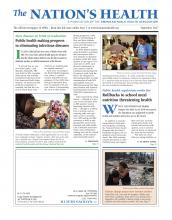Sports and other recreational activities are a great way for your child to learn how to be a team player, follow instructions and have fun while getting exercise. But if your child experiences a hit, bump or blow to the head or body, that calls for a time-out. Your child could be at risk for concussion, a kind of traumatic brain injury that affects the ability to think clearly and move normally. In serious cases, a concussion can even cause a fatal blood clot in the brain. Concussions are no small matter, but you can help your child stay safe on and off the field.
There are many different ways to get a concussion, and they all aren’t related to contact sports such as football or hockey, says Matt Brieding, PhD, team lead of the Division of Unintentional Injury Prevention at the Centers for Disease Control and Prevention. He notes that playground injuries and activities such as bicycling are some of the top causes of concussion that result in trips to the emergency department. Any situation in which your child could fall or experience bodily force also means there is a risk for concussion.
The likelihood of getting a concussion also depends on your child’s surroundings. If your child does take a tumble, for example, landing on a soft surface will at least be safer than hitting hard pavement. That’s why Brieding recommends that kids stick to playgrounds with soft material such as rubber or sand in case they do fall.
While protective headgear is important for sports and play, remember there is no such thing as a helmet that can protect against concussions. Helmets offer some defense against severe brain injury, but you shouldn’t rely on them alone, says Brieding. However, he encourages parents to check that their child’s helmet is appropriate for the activity, is in good shape and fits well.
If your child takes any kind of hit, she or he should stop playing immediately so that you can assess any possible injuries. Signs of concussion aren’t always easy to spot, so you need to know the symptoms to look out for. In movies and on TV, concussions are often shown as knocking people out, but that’s not usually the case. There are some tell-tale symptoms to watch for right after your child takes a hit, and in the days and weeks after.
Your child may struggle to follow instructions, recall events before the injury or answer questions. She or he may also have trouble staying balanced.
Listen to any complaints about dizziness, nausea or headaches. These symptoms may be subtle, and lead to changes in your child’s mood that are difficult to pinpoint. But if your child says she or he isn’t feeling quite right, pay attention, because concussion could be to blame.
Getting symptoms checked out right away is a must because a severe concussion can lead to long-term complications, according to CDC. Your child could have problems with memory and learning, emotions, coordination, speech, hearing or vision. They could even experience emotional problems that affect how they interact with friends and family.
Fortunately, acting quickly and listening closely to your child can prevent serious complications.

“The myth that we’re most concerned about is that this is the type of injury you can just shake off,” Brieding tells The Nation’s Health. “It’s a serious injury even for the most mild of concussions and…a physician should be consulted in all cases.”
If your child is diagnosed with a concussion, there’s no need to panic. With the right medical attention, your child will likely be feeling back to normal in a relatively short amount of time.
Play by the rules to protect your noggin
For safer play all-around, following the rules is a must. Being a good sport is not only about respecting others; it also means caring for your body, Brieding says. Whether your child is playing soccer, hockey or football or practicing gymnastics, make sure she or he is following all instructions carefully.
“A lot of the rules are sports-specific, and it tends to be that the rules that are in place are often geared toward player safety,” Brieding says, especially when it comes to the most dangerous types of contact.
Talk to your child about why it’s so important to be a good sport to reduce the risk of injuries and get the most out of playtime. Also, be sure to talk with your child’s coach about strategies for preventing concussions.
- Copyright The Nation’s Health, American Public Health Association









